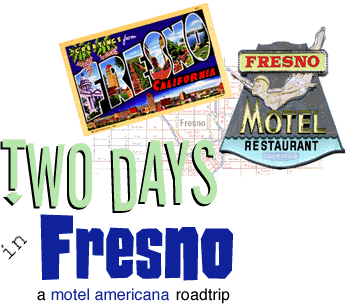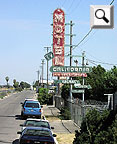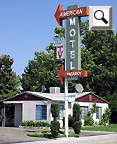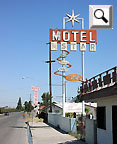


 Pushing through central California on diesel exhaust, the remnants of U.S. Highway 99 have no pretences of becoming another tourist haven.
Mother Road dreams of California orange blossoms are abandoned once folks turn north on 99, land of no-nonsense factories, heat-ravaged cafes, and seasonal workers with backs burnt akimbo. I've come to visit Fresno, sun-dried metropolis of the Central Valley.
Pushing through central California on diesel exhaust, the remnants of U.S. Highway 99 have no pretences of becoming another tourist haven.
Mother Road dreams of California orange blossoms are abandoned once folks turn north on 99, land of no-nonsense factories, heat-ravaged cafes, and seasonal workers with backs burnt akimbo. I've come to visit Fresno, sun-dried metropolis of the Central Valley.
South of town, the Golden State Boulevard carves through Selma, by the American Motel. The owner is reading a copy of Tzu Chi World but he's got a Norman Rockwell calendar on the wall, and his blue doors are striped in red and white. Across the street in the Freeway Food where you can buy 7-up by the bottle, a pimply faced girl in a Billabong t-shirt chats with the cashier, reporting matter-of-factly: "If he does that to me, I'll walk out." She bags my groceries without looking up.
Back on the highway, Motel California climbs from the dust and haze, surrounded by a menace of coiled scalpel wire. The compound has become a halfway house for guys getting out of prison. But they can check out whenever they like. The residents are here to get settled, find a job, readjust to life on the outside. Some have no other place to go. The woman at the front desk says, fence or no fence, "if someone gets angry and wants to leave, we let 'em. Then we make some calls." Sweating in white undershirts, these dudes are in no hurry.
 Snaking through an abandoned industrial zone, Highway 99 assumes its original name, Golden State Blvd. Along the way, the Capri, the Ayres, and the Big Star motels have lost their linen postcard beauty, abandoned by a city with enough cheap land to build elsewhere. Fresno is a town built for 100-degree days and boiled over engines, ready to keep walking rather than wait by the side of the road. Cruising through the downtown, you can find no skyscrapers to block your view and few reasons to stop. The Tower District manages to pull together a few pricey boutiques and eateries to match the streamlined neon majesty of its art deco theatre. But, a few blocks away, Old 99 becomes Motel Drive, and Fresno returns to its gritty side. The Fresno, Sands, and Del-Mar itch under the glare of a cloudless sky.
Snaking through an abandoned industrial zone, Highway 99 assumes its original name, Golden State Blvd. Along the way, the Capri, the Ayres, and the Big Star motels have lost their linen postcard beauty, abandoned by a city with enough cheap land to build elsewhere. Fresno is a town built for 100-degree days and boiled over engines, ready to keep walking rather than wait by the side of the road. Cruising through the downtown, you can find no skyscrapers to block your view and few reasons to stop. The Tower District manages to pull together a few pricey boutiques and eateries to match the streamlined neon majesty of its art deco theatre. But, a few blocks away, Old 99 becomes Motel Drive, and Fresno returns to its gritty side. The Fresno, Sands, and Del-Mar itch under the glare of a cloudless sky.
The next day, I'm at the Storytime Motel where an orange traffic barricade reads, "No visitors after 6 p.m. No drugs. 5 miles per hour." Sunday morning at eleven, scruffy kids cavort on the concrete where a pool used to be. They keep an eye for the old hermit who's lived here for thirteen years, the one who meows at the kids like a cat. Even so, it doesn't take long for a stranger to get noticed, and I meet the self-appointed sheriff of these parts. Jeremy's got a stainless steel stud beneath his lower lip and flashes a wary smile. His conversation follows a halting cadence of a guy whose got plenty of time to chat. He's been a Storytime resident for about eighteen months, and he's got a lot on his mind. Turns out some newspaper reporters came out back in '98 to celebrate the newest project of the PEACE (People Enhancing At-Risk Children's Education) Program. The Fresno Bee offers glowing testimony of dozens of motel kids - all termed homeless by the local school district - cutting a paper ribbon strung across a motel room turned into a homework center.
"We're going to do our homework," they serenade.
But the children, including Jeremy's four little ones, still navigate a treacherous terrain of pimps and pushers. The teachers and cops try to stay involved, but they can't do enough; it's the local churches making the biggest difference with sack lunches, weekend barbecues, and plenty of prayer. But nighttime returns to Motel Drive, and so do the addicts. Jeremy explains:
Before long, Willie drops by with a bunch of bananas, handing them to Jeremy's kids. When the conversation turns to what Jeremy calls the soap opera drama of the residents' interactions, his friend laughs: "We're just livin', right? Livin', right? We all just tryin' to survive . . . it's like family."
Later on, while shooting the Storytown sign in better light, a girl comes out wearing short shorts and a temper: "What you doing on my street, bitch?" she threatens: "I'm gonna kick your ass, punto." For a moment, I stand there dumbstruck.
Heading out of town, north on 99, Christmas lights hang sullenly from the office overhang at the Astro Motel. It's the beginning of July. At the Astro's butt-end, a transmission tower stands protected from local punks by twisting razor wire, shimmering in the white heat of summer. Across an empty no man's land of burnt scrub, ticky-tacky houses offer a monotone fortress against the city. Jutting away from each sharply sloped roof, an air conditioning unit offers a turret against the hoards and heat.